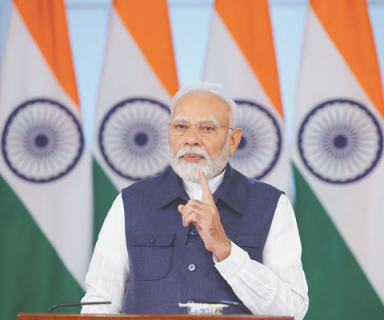
The ceasefire agreement between India and Pakistan remains fragile. In Delhi, they say that it is indefinite, and in Islamabad they say that its term ends on May 18. This move by Islamabad is aimed at forcing India to commit itself to observing the truce that came into force with the mediation of Washington. But the root causes of the conflict remain. Although the militants who killed 26 people in the Indian part of Kashmir about a month ago had a foothold on Pakistani soil, Islamabad does not recognize its responsibility for the attack and does not want to take action against extremists. Both India and Pakistan claim ownership of all of Kashmir. The hardest fate has befallen ordinary residents in Indian Kashmir, who fear a resumption of hostilities.
The conflict between India and Pakistan has its roots in history. On the rocks near one of the borders of Pakistan, you can read the names of the British units that were stationed there. The British left in 1947, and the two states, which they divided along religious lines, are still at war with each other. The neighbors went to war three times, and twice over Kashmir.
The New York Times writes that under Prime Minister Narendra Modi, India has implemented socio-economic reforms that could allow it to gradually raise the standard of living of the general population and get out of the list of poor countries in the world. However, Pakistan, which has established almost allied ties with China and buys fighter jets, drones and other military equipment from it, is able to slow down India’s progress along this path.
Formally, China called for a cease-fire between India and Pakistan. But Beijing’s press enthusiastically described the success of Pakistani weapons. This makes it clear which side the Chinese sympathies are on. Moreover, Western media reported that the Pakistanis shot down two fighter jets supplied by France and two aircraft of joint Indian-Russian production. These reports even led to a decline in the share price of the French corporation Dassault, which produces fighter jets.
Fortunately, at the time of signing the newspaper’s issue, there was no information that India and Pakistan were again exchanging drone strikes, missiles and projectiles from airplanes. As reported by the Indian PTI news agency, the command of the two armies has agreed on a cease-fire, this agreement is not limited to any date. Thus, Delhi, firstly, denied the information of some media outlets that reported a possible resumption of hostilities. And secondly, India has reaffirmed its firm commitment to the India-Pakistan agreement reached in the Indian highland resort of Simla in 1972. Delhi and Islamabad then agreed to resolve their differences on a bilateral basis, without interference from third countries.
And when the shooting stopped, those residents in the Indian part of Kashmir who had houses and apartments near the line of control replacing the border with Pakistan began to return to their homes to see what had happened to their homes. That’s what The Guardian newspaper said. Both India and Pakistan have declared victory. But in Kashmir, people are scared. The woman, whom everyone politely addresses as Begum, thus emphasizing that she comes from a well-born family, says that her house is dilapidated.
Although the neighbors value the fragile peace very much, few of them believe that it will last long. “I pray for silence. But these two states will never peacefully coexist until their differences are resolved. It’s only a matter of time – maybe weeks, months, years, until we get involved in the war again,” Begum believes.
So do many other Kashmiris and outsiders. After all, the circumstances that led to the confrontation have not changed. After the terrorist attack about a month ago, which killed tourists, the police distributed leaflets with images of militants. One of them is local, the other two are Pakistanis. A reward of 2 million rupees (approximately 19 thousand pounds) has been announced for their capture. None of them have been caught.
The head of the Indian government, Narendra Modi, said that India had taken a pause in military operations. She can resume them when needed.
